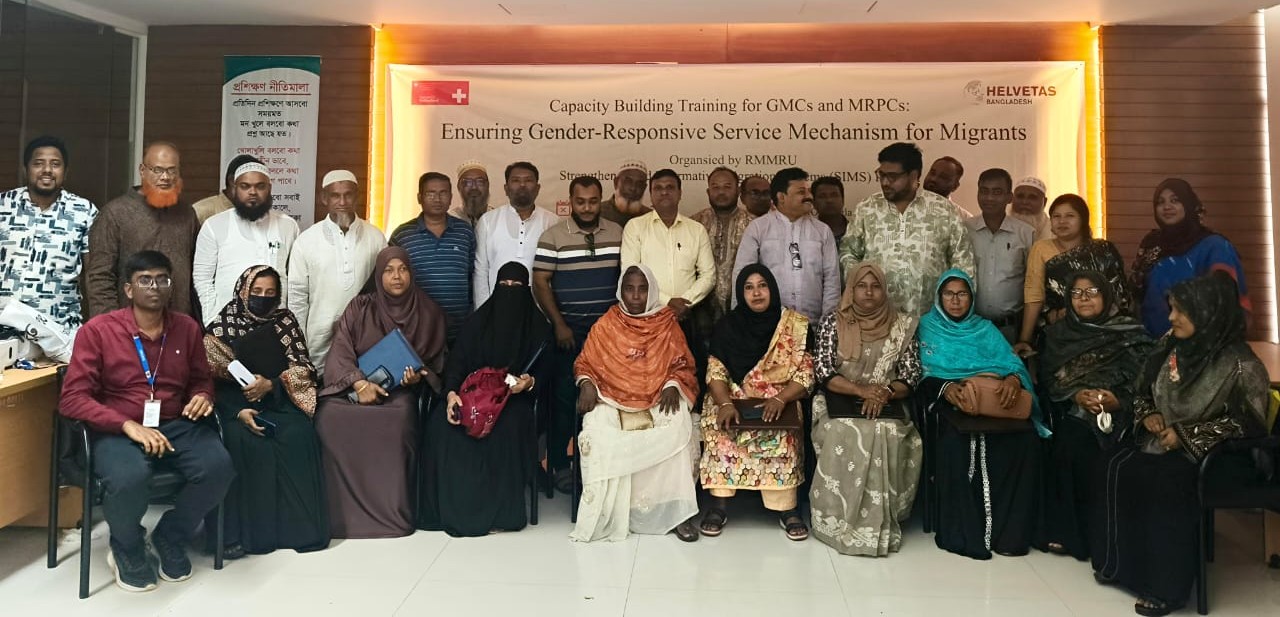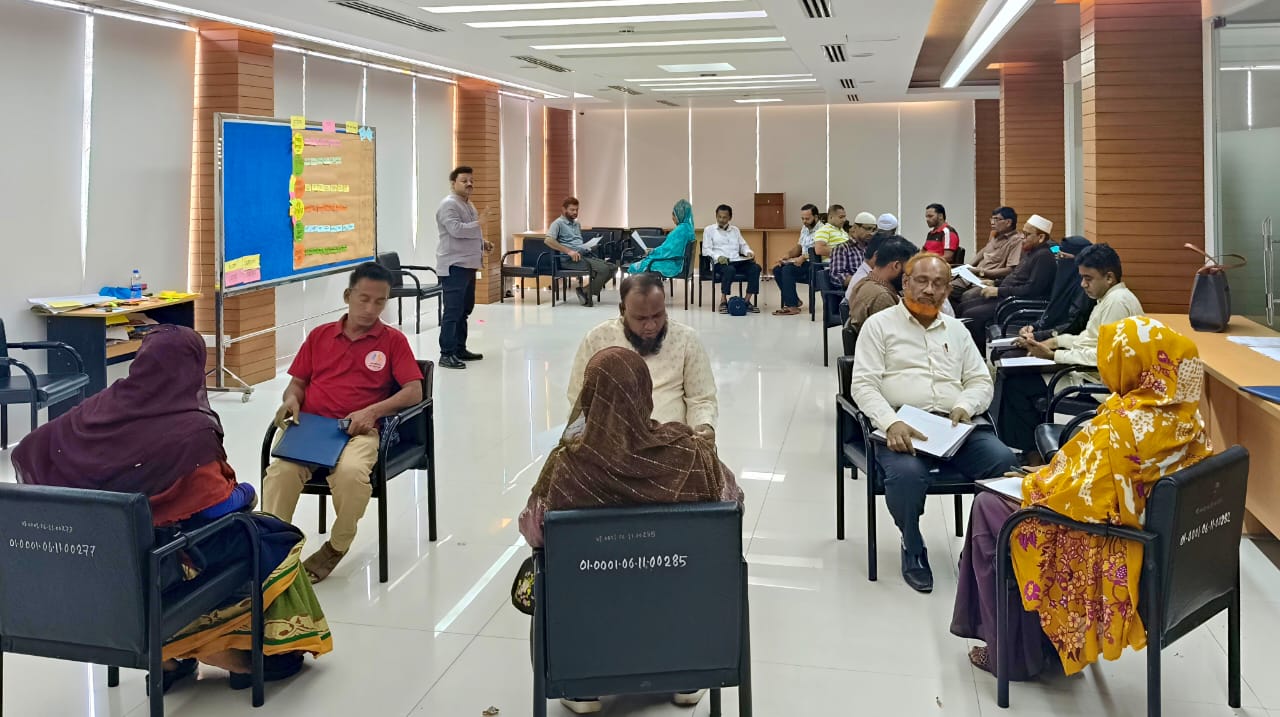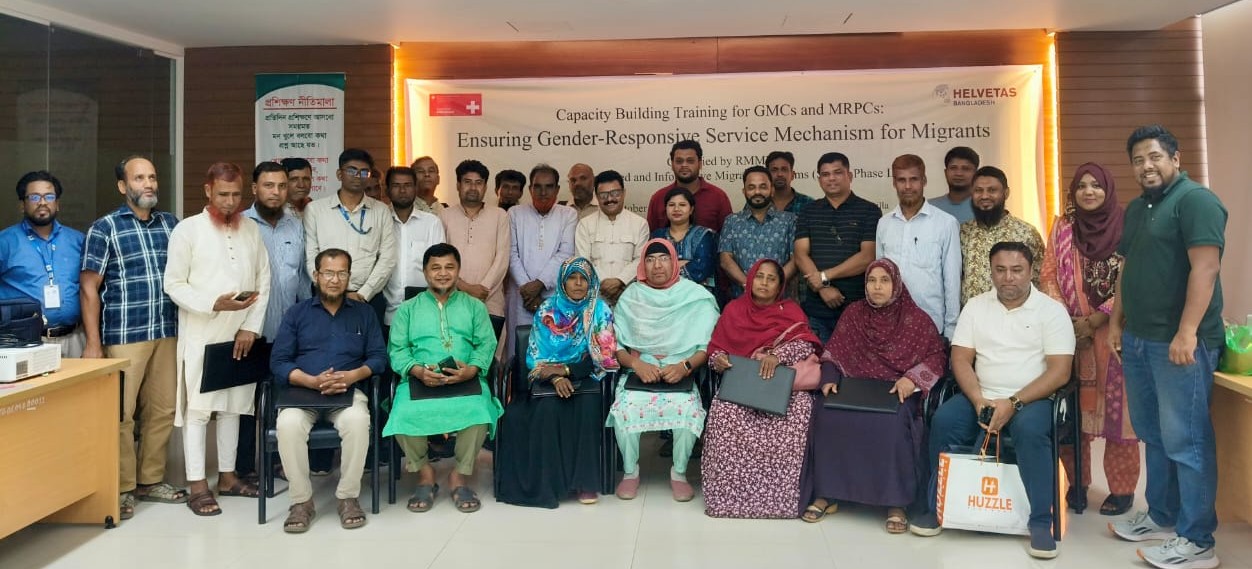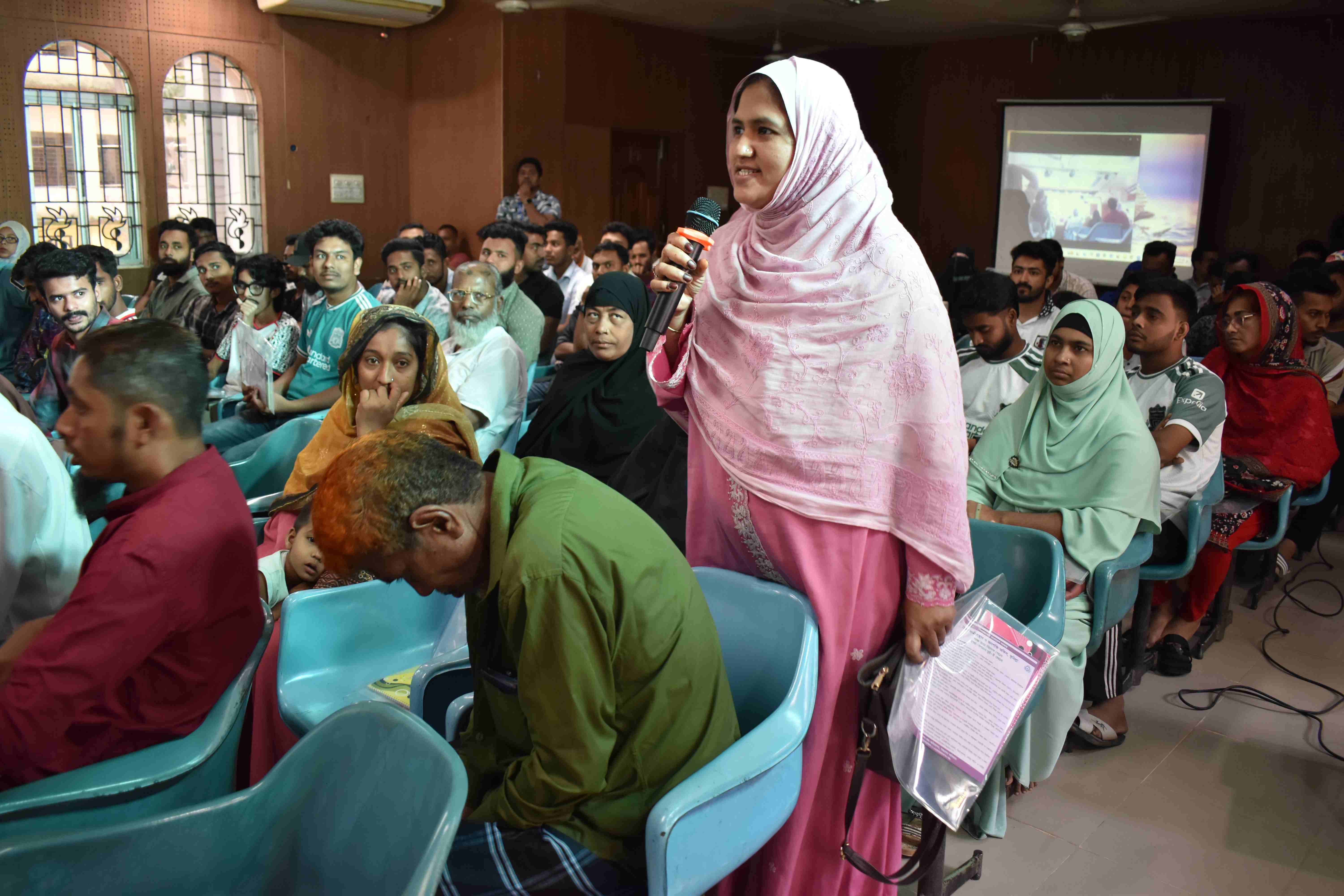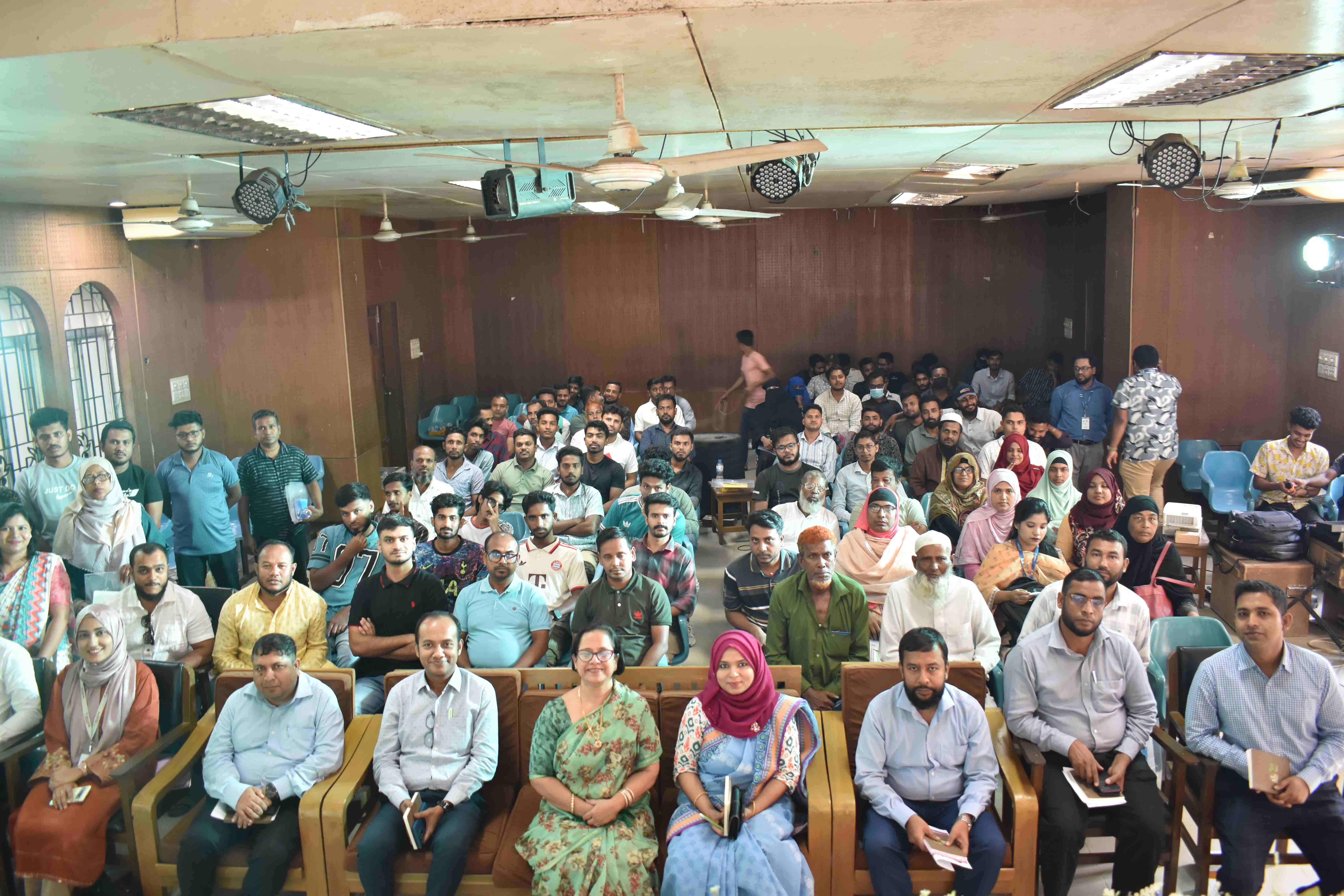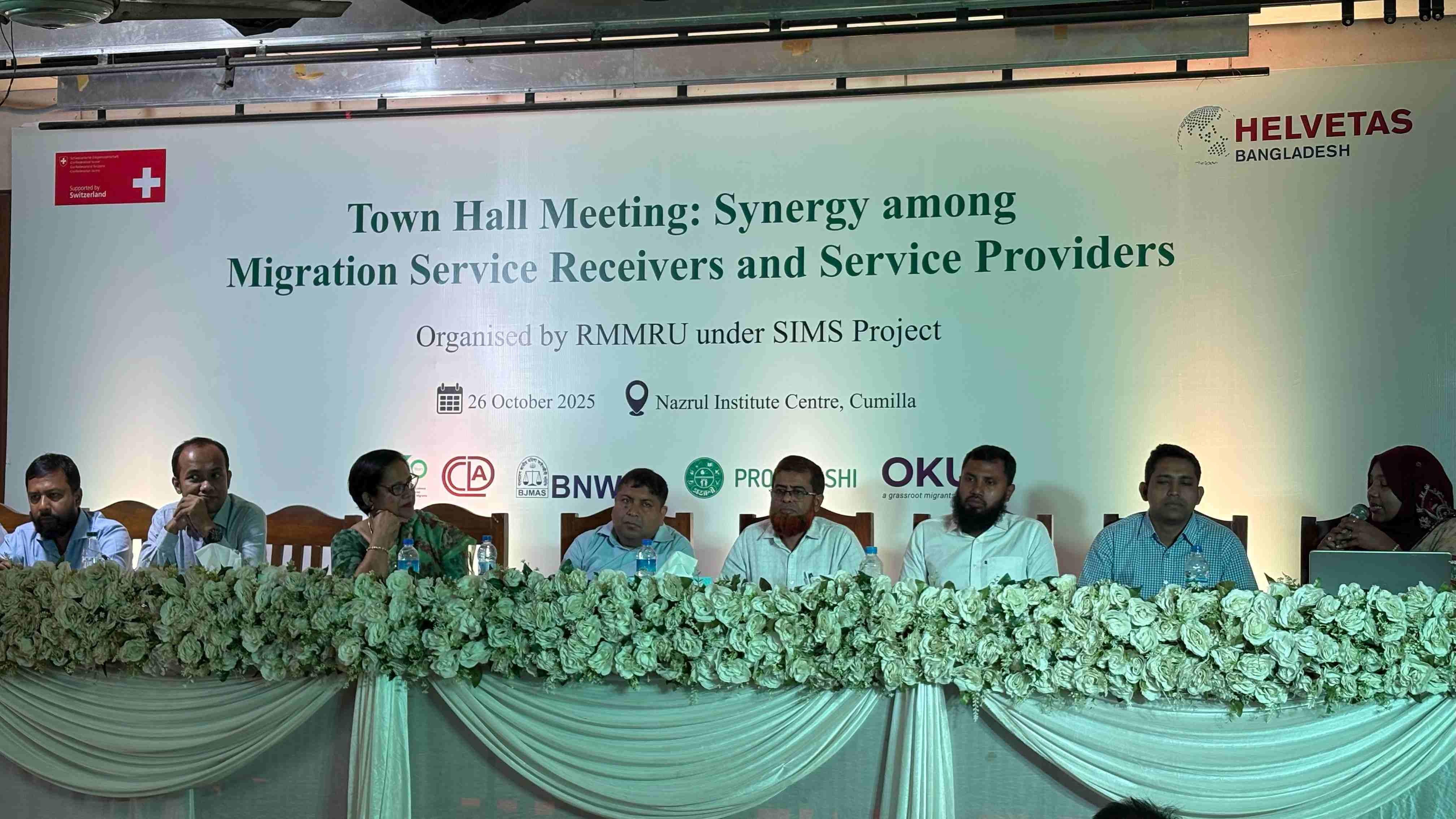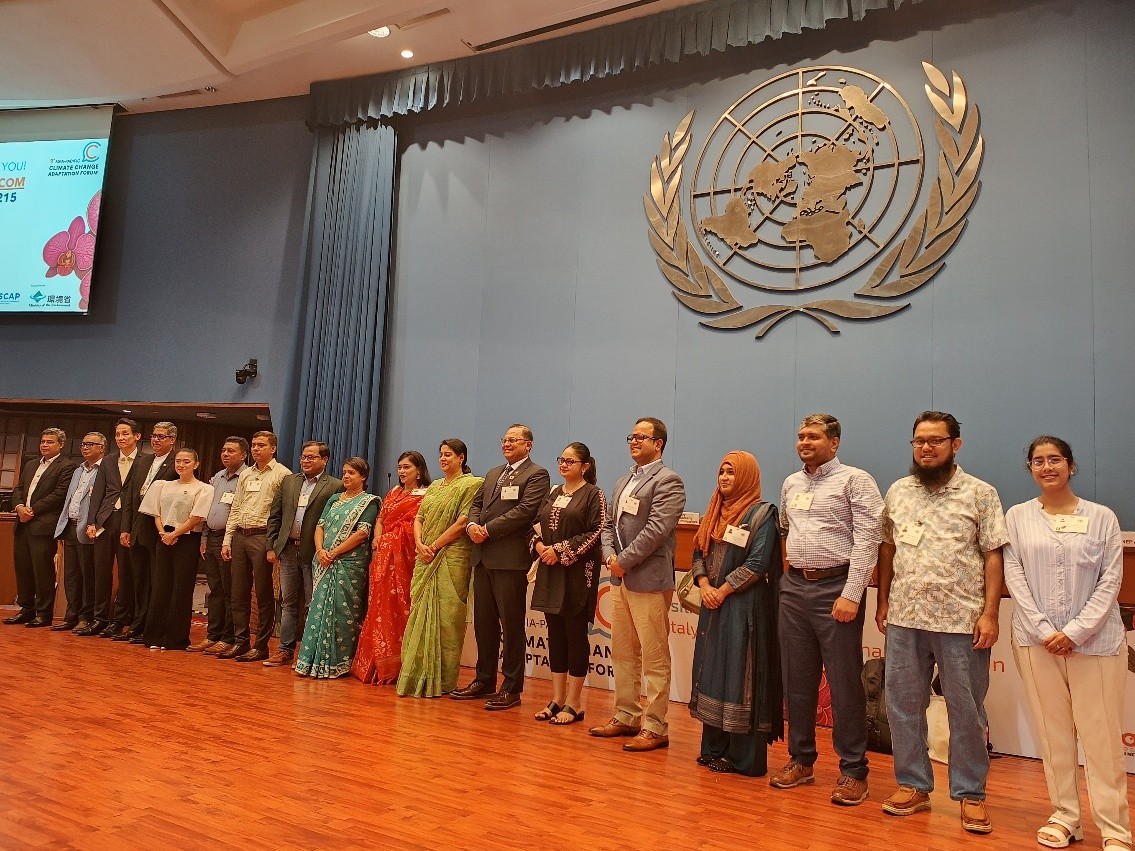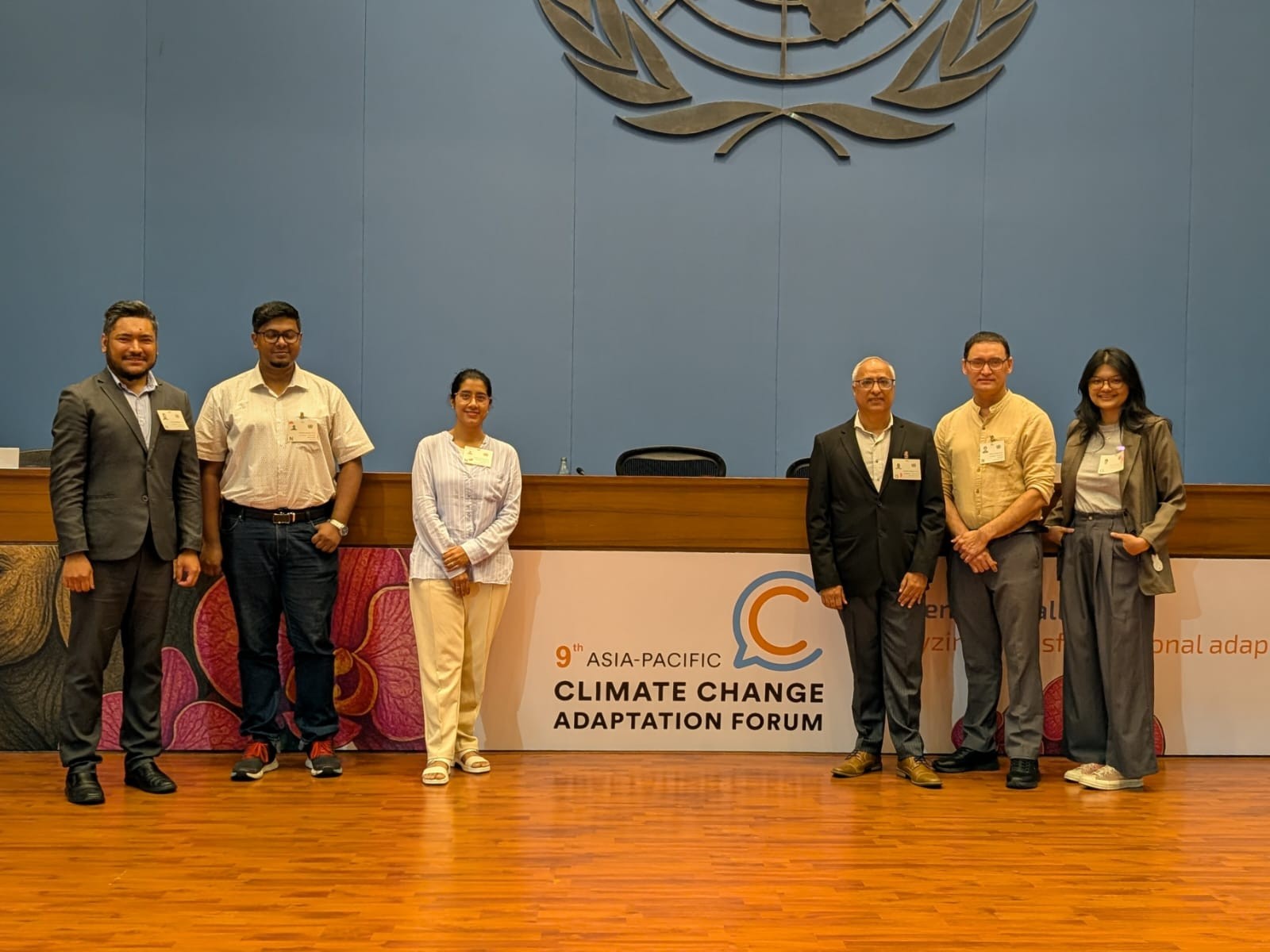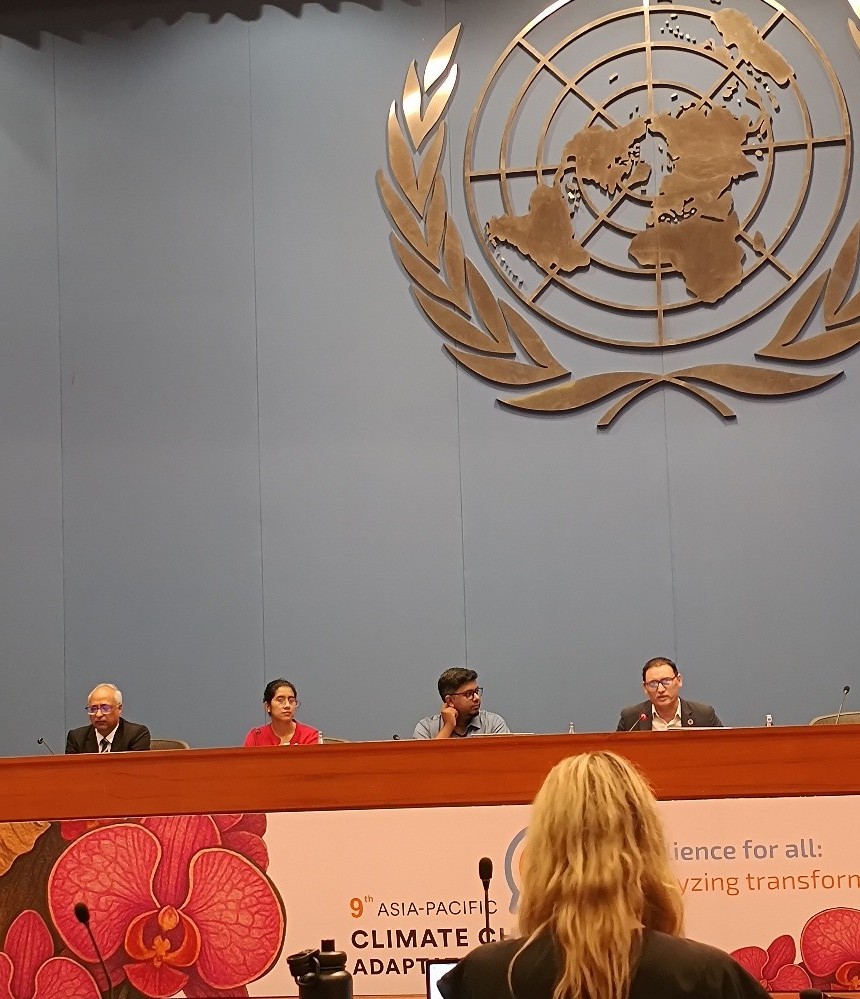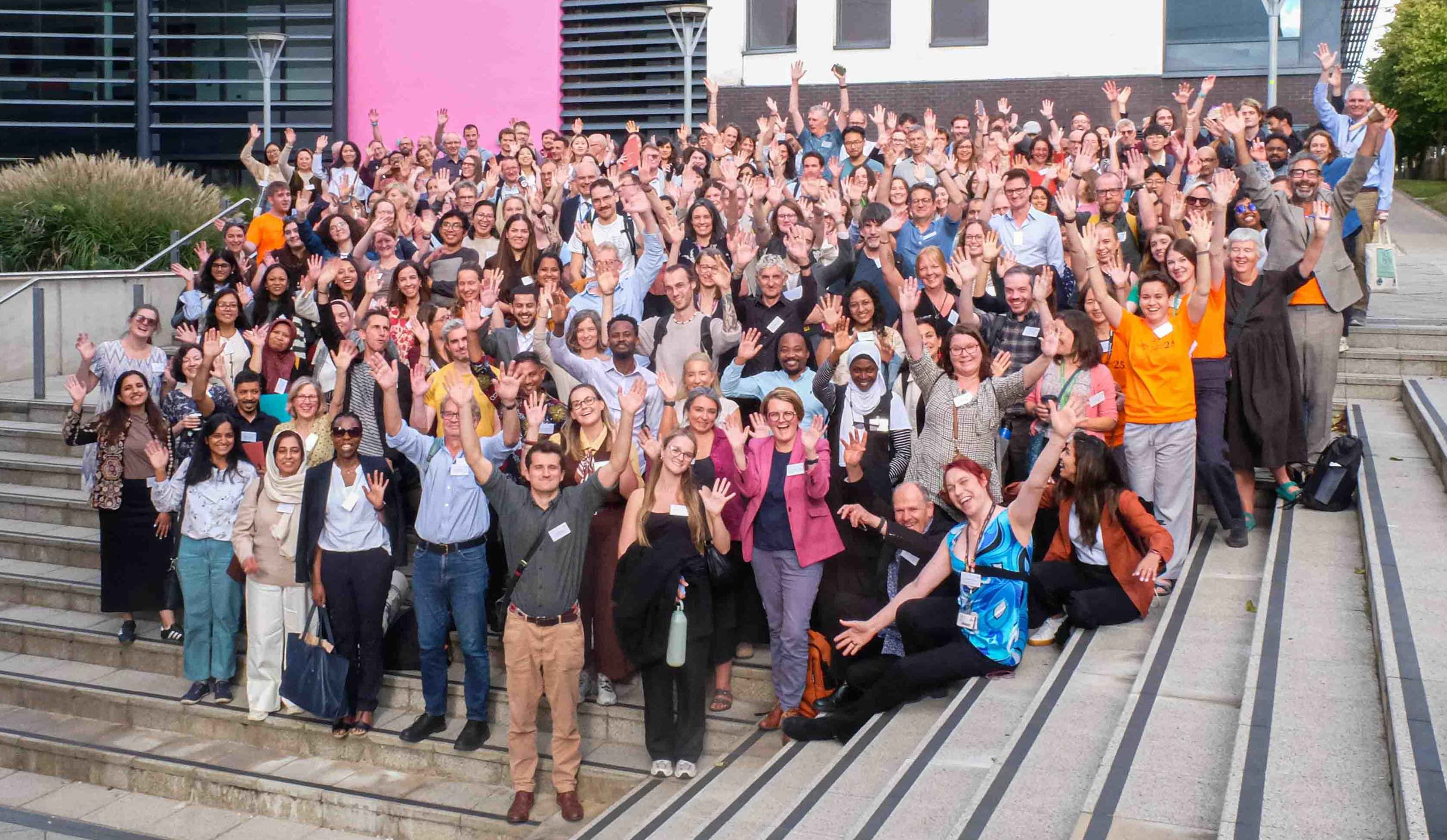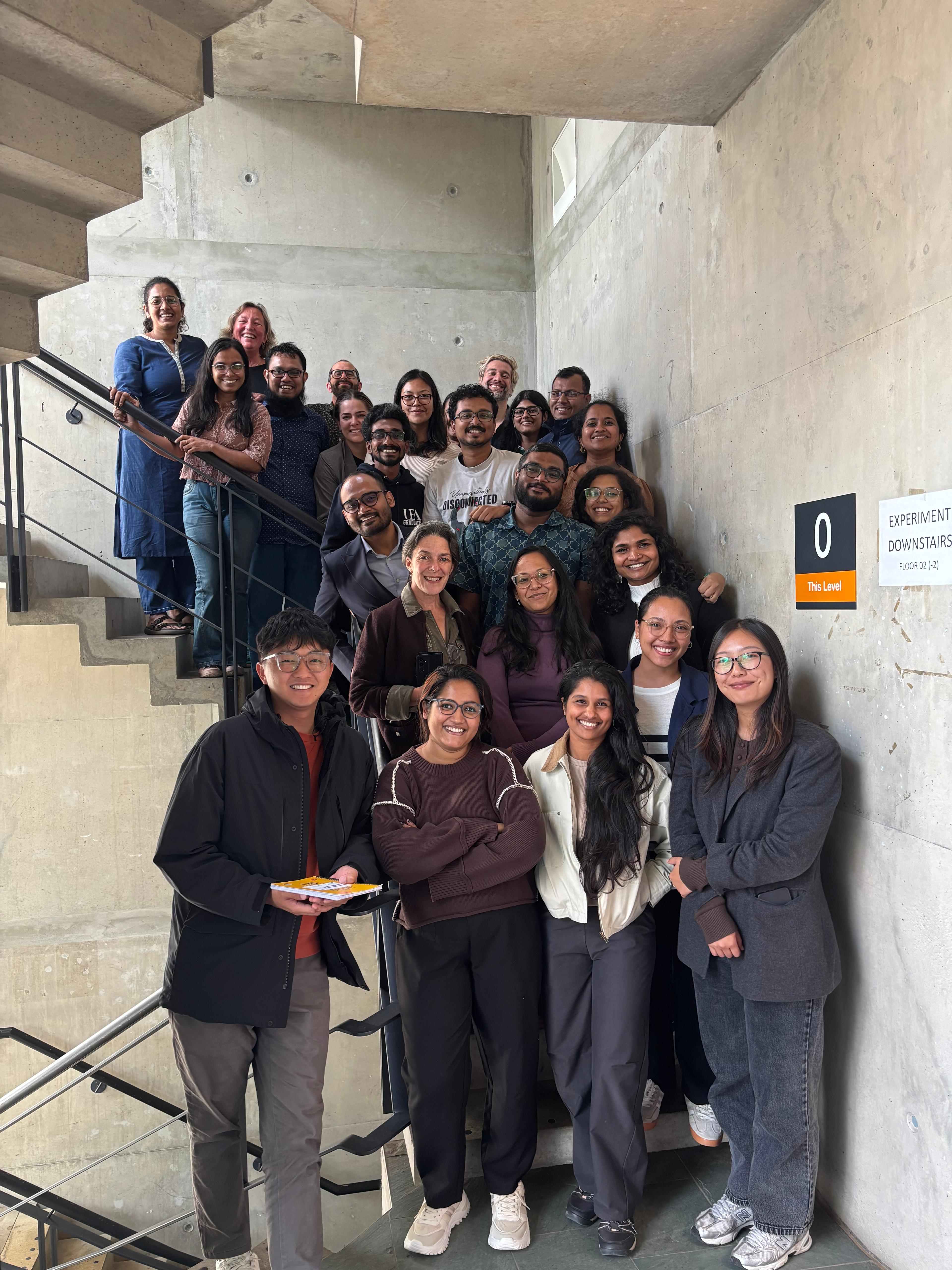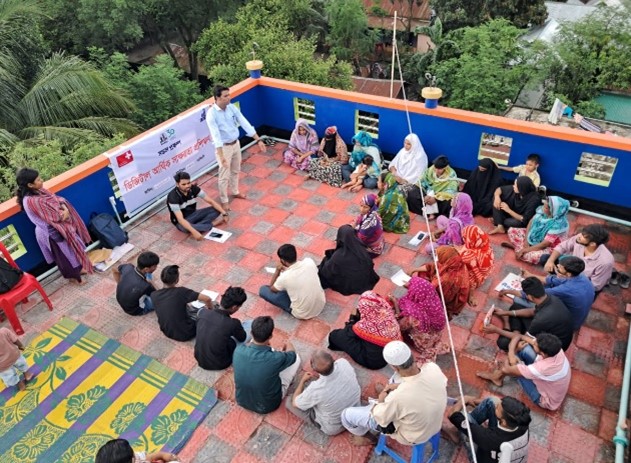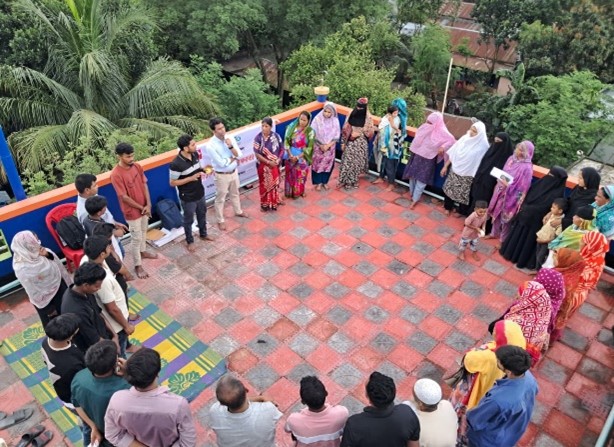Capacity Building Training for GMCs and MRPCs: Ensuring Gender-Responsive Service Mechanisms for Migrants at the Grassroots
Date: 28 to 30 October 2025
Venue: BURO Bangladesh, Cumilla
October 28 to 30, 2025, BURO Bangladesh in Cumilla hosted a Capacity Building Training for members of Grievance Management Committees (GMCs) and Migrant Rights Protection Committees (MRPCs). The training took place in three one-day batches, with a total of 79 participants from 25 unions. Among them 20 women, 1 transgender person, and 58 men, including Union Parishad Chairpersons, committee members from GMCs and MRPCs.
Dr. Motahar Akand, a renowned gender expert with expertise in human rights, gender, leadership, and management. He served as the trainer for all session with participatory training approach. The training was part of the Strengthened and Informative Migration Systems (SIMS) project, which is implemented by RMMRU and supported by Helvetas Bangladesh and Swiss Agency for Development and Cooperation (SDC). Its goal was to strengthen the capacity of GMC and MRPC members to deliver gender-responsive migration governance at the local level.
The main purpose of the training was to increase participants’ understanding of gender sensitivity and inclusive service delivery. The training focused on the rights of migrant workers, particularly the challenges faced by women, and provided practical skills in managing complaints. This helped ensure that the committees would be better equipped to address the specific needs of both male and female migrants.
The training also aimed to assess the participants’ existing knowledge to help tailor the sessions and measure their progress. By the end of the program, participants had a deeper understanding of gender issues. They were better equipped to protect and promote the rights of migrants. More capable of applying inclusive practices in their work. They also gained essential skills to manage complaints more effectively, contributing to a fairer and more accountable grievance redress system in their communities.
Town Hall Meeting: Synergy among Migration Service Receivers and Service Providers
Date: 26 October 2025
Venue: Nazrul Institute Center, Cumilla
On 26 October 2025, RMMRU organised a town hall meeting titled “Synergy among Migration Service Receivers and Service Providers” in Cumilla under the SIMS project. More than 100 migrant workers and their family members attended the programme. The aim was to create a space where migrants could share their experiences and raise questions directly with service providers.
Professor Tasneem Siddiqui, Acting Executive Director of RMMRU, moderated the discussion. The event was inaugurated online by Mr. Saleh Ahmed Muzaffar, Director General (Grade-1) of the Bureau of Manpower, Employment and Training (BMET). He said, now need to declare Cumilla as a “Safe Migrant District.” He requested the District Administration and all relevant institutions, including BMET, DEMO, Wage Earners’ Welfare Board, Probashi Kallyan Bank, TTC and the Passport Office, to work together to achieve this vision.
Officials from TTC Cumilla, BMET, DEMO, Probashi Kallyan Bank, Wage Earners’ Welfare Board, the Departments of Youth Development and Social Services expressed their commitment to better coordination and continued support for migrants.
Additional Deputy Commissioner (Development and Human Resource Management), Ms. Sultana Razia, praised RMMRU and said the District Administration would lead efforts to promote safe migration, including through the Migrant Welfare Desk.
In closing remarks, Acting ED of RMMRU Professor Tasneem Siddiqui reaffirmed RMMRU’s commitment to safe migration, calling for transparent, accountable services and the abolition of syndicate practices. The meeting ended with a shared commitment to work together to improve services, transparency and accountability. So that migration from Cumilla becomes safer and more responsive to migrants’ needs.
The event was organised by the Refugee and Migratory Movements Research Unit (RMMRU) under the SIMS project, in collaboration with Helvetas Bangladesh and with support from the Swiss Agency for Development and Cooperation (SDC).
9th Asia-Pacific Climate Change Adaptation (APAN) Forum
Theme: Resilience for all: Catalyzing Transformational adaptation
Date: September 29 - October 3, 2025
Location: Bangkok, Thailand
The 9th APAN Forum in Bangkok held a conference in which climate adaptation practitioners, policymakers, and civil society came together to work on Catalyzing Transformational Adaptation. 896 participants of various nationalities attended the conference. Mr. Mahmudol Hasan Rocky and Ms. Nazia Khan Lina of RMMRU were present at the conference. The event was also graced by the presence of Ms. Syeda Rizwana Hasan, Honorable Advisor to the Ministry of Environment, Forest and Climate Change (MoEFCC) and the Joint Secretary of the Ministry of Finance. A presentation of the SUCCESS project by the RMMRU team revealed the correspondence to the transformational adaptation. The SUCCESS project implies that climate-related migration should not be treated as a failure of local adaptation but as a proactive and feasible tool to develop resilient livelihoods.
The groundwork of these discussions was laid in the Deep Dive sessions of the forum, which were dedicated to practical recommendations of National Adaptation Plans (NAPs), scaling up of Locally Led Adaptation (LLA), and freeing up financing of justice-centered initiatives. One of the main lessons was the necessity to instill Indigenous and local knowledge in adaptation strategies and abandon top-down solutions.
Nevertheless, the SUCCESS project revealed that there were major challenges, such as the existence of negative stories that are deeply entrenched and that migration is a failure, institutional inertia that creates policy loopholes, and the inevitable threat of maladaptation where solutions unintentionally exploit vulnerable populations, especially women.
The way ahead, as outlined by the forum, is to address these issues directly. This encompasses actively transforming the narrative by using powerful human-focused narratives; co-creation, which brings different ministries of the government to the same table to break down policy silos; and equity, where they collect gender-disaggregated data to create truly inclusive interventions. Through capacity-building of local stakeholders, the development of flexible and scalable solutions, the region will be able to keep the momentum going even after the end of the forum, and the issue of climate change will become an avenue to a more sustainable and just future.Tyndall Annual Conference 2025 and ECR Seasonal School
Organised by: University of East Anglia (UEA)
Date: 8th to 10th September, 2025 (Conference) & 13th to 15th September, 2025 (Seasonal School)
Venue: University of East Anglia (UEA), Norwich, UK
Mr. Mahmudol Hasan Rocky, Mr. Mohammad Rashed Alam Bhuiyan, Mr. Md Redwanul Islam Chowdhury and Mr. Parvez Bhuiyan from RMMRU attended The Tyndall Annual Conference 2025 of Tyndall Centre for Climate Change Research and The Seasonal School for Early Career Researchers (ECRs) of SUCCESS/CLAPs at University of East Anglia (UEA) in UK.
The conference held from 8th September to 10th September 2025 at UEA Campus where Climate Experts, Academics, Researchers, Scholars from different regions of the world shared their knowledge and works on Climate Change Action. Several peralal sessions were designed for exchanging knowledge with the people from different countries. Around 200 participants from across the world attended the conference. Researchers from RMMRU have presented two posters in the conference. Barriers to Implementation of Displacement Policies and Strategies in Bangladesh is one of the posters where Mr. Md Redwanul Islam Chowdhury, Mr. Parvez Bhuiyan and Mr. Mahmudol Hasan Rocky are the authors and another poster is Gendered Perspectives of Precarity and Wellbeing amidst Environmental Vulnerabilities and Climate Change where Dr. Mohammad Rashed Alam Bhuiyan and Mr. Mahmudol Hasan Rocky are the authors.
Early Career Researchers (ECRs) from RMMRU also attended the SUCCESS/CLAPS Seasonal School held from 13th September to 15th September, 2025 at UEA Campus where 20 early career researchers from SUCCESS/CLAPS team from Bangladesh, Bhutan, India, Nepal and UK were also attended to the event. Dr. Mark Tebboth, Associate Professor in Environment and Global Development at the University of East Anglia and Dr. Ricardo Safra de Campos is Senior Lecturer in Human Geography at the University of Exeter conducted the school and several experts from the climate change sector shared their experience. They have taught on how research impact to the society, policymakers, scientists and relevant parties. Participants also learnt how to write article and Ricardo and Mark also driven ECRs into an article on challenges and opportunities of ECRs. ECRs promised to complete the writeup by this year and published by the project period. Mark and Ricardo will assist until publish the article.
School-Based Programme: Knowledge and Awareness-Building Session
Date: 24 August 2025
Venue: Kamrabo High School, Narsingdi
On 24 August 2025, RMMRU organized a Knowledge and Awareness-Building Session at Kamrabo High School, Narisingdi under Shafal Project. The session brought together students of Class IX and X to learn about issues that matter deeply for their futures and communities.
The session focused on some of the most important life lessons; how migration can be made safe, why remittances matter for families and for Bangladesh, and how money sent home can be managed wisely. Students explored how using proper remittance channels benefits families and the nation, the dangers of informal transfers like hundi, and how careful savings, investment, and entrepreneurship can transform remittances into opportunities for sustainable development.
The discussions were interactive and engaging. Students shared their views on household spending, debated what counts as necessary and unnecessary expenses, and reflected on how financial awareness within families can make lives more secure. To make the learning more practical, each student was given a short reading, followed by a lively quiz competition. Excitement filled the room as everyone took part, and the top three scorers were awarded for their achievement.
Response from the students were inspiring. Many expressed that they had never thought about migration and remittances in this way before. They enjoyed the discussions, participated with great enthusiasm, and were especially thrilled by the quiz and prizes. The session not only made them more aware of safe migration and responsible remittance use, but also encouraged them to think about developing an entrepreneurial mindset for their own future.
In total, 45 students participated in this event; 12 boys and 33 girls facilitated by RMMRU Team and Mukul Hossain Kazi, District Project Associate, UNCDF. The school’s Head Teacher, Akhtaruzzaman and Assistant Teacher, Afzal Hossain provided valuable coordination, and also expressed appreciation for how such initiatives inspire young learners.
School-Based Programme: Knowledge and Awareness-Building Session
Date: 19 August 2025
Venue: Goyeshpur Padmalochan High School, Jinaradi, Palash Upazila, Narsingdi
A knowledge and awareness-building session was held at Goyeshpur Padmalochan High School on 19 August 2025 under the RMMRU Shafal Project. The programme was designed to enhance students’ understanding of safe migration, remittance management, financial planning, and responsible use of remittance resources. Special emphasis was given to the role of remittances in socio-economic development and entrepreneurship, with the broader aim of building awareness at the community level.
Around 89 students from Class IX took part in the session, including 32boys and 57girls. The discussions were facilitated RMMRU Team and Mukul Hossain Kazi, District Project Associate, UNCDF. School’s Head Teacher (Acting) Al Amin Razi, along with Assistant Teacher, Nurul Haque, coordinated the programme on behalf of the school administration.
Throughout the session, several important themes were addressed. Students were introduced to the concepts of migration and safe migration practices, the significance of remittances, and the importance of proper financial management. They learned how to differentiate between necessary and unnecessary household expenses and were made aware of the risks associated with using unauthorized channels, such as hundi, for sending remittances. The facilitators explained how illegal remittance transfers negatively affect individuals, families, society, and the state. In contrast, students were encouraged to view remittances as tools for development, promoting savings, investment, and entrepreneurship. The discussions also highlighted the importance of family, social, and financial awareness in ensuring productive utilization of remittances.
To assess their learning, the students participated in a multiple-choice test. The exercise not only helped to reinforce the lessons but also created a sense of excitement and engagement among the participants.
The feedback from the students was positive. Many expressed that this was the first time they had been exposed to such important topics, and they welcomed the opportunity to learn about issues directly linked to their families and communities. The students showed genuine enthusiasm, particularly upon receiving pens and session materials, and indicated that they were eager to share the knowledge with their families, including relatives working abroad.
Financial Literacy Training: Hajipur (Batch 01)
Date: 29 July 2025-12 August 2025
Venue: Hajipur Union, Narsingdi
RMMRU under SHAFAL project conducted Digital Financial Literacy Training of Batch 1: Hajipur Union, Narsingdi between 29 July and 12 August 2025. Over the course of six interactive sessions, 27 enthusiastic participants including 10 small entrepreneurs came together to learn, practice, and share their experiences on savings, budgeting, responsible loan management, and safe digital financial practices.
The 40hours sessions were designed to be participatory and engaging. Through group discussions, storytelling, role play, quizzes, participants explored how to create financial dreams, track family expenses, use formal financial services, conduct safe mobile transactions, and develop action plans for the future. Each session combined practical exercises with real-life examples, making the learning process both enjoyable and impactful. All are connected through Whatsapp groups.
Upon finishing the session, some participants have started investing their savings into their ongoing businesses, while others have taken the first steps into new entrepreneurial activities. The WhatsApp group continues to be an active space where participants exchange ideas, share their budgeting practices, and support each other in their financial journeys.
The training proved to be a powerful experience. It not only built confidence in managing money wisely but also encouraged participants to embrace digital tools for savings, transactions, and financial planning. With follow-up mentoring and expansion to more communities, this initiative can create a stronger foundation for financial empowerment and better remittance management across Bangladesh.
Message Development Workshop
Date: 28 July 2025
Venue: Applied Democracy Lab, University of Dhaka
RMMRU organized a “Message Development Workshop” to co-create effective awareness content that reflects the realities of migrant families and their remittance experiences under the SHAFAL Project (Remittance Management for Socio-Economic Stability of Migrant Families) supported by the Embassy of Switzerland in Bangladesh and UNCDF.
The workshop was held on Monday, 28 July 2025, at the Applied Democracy Lab, University of Dhaka. It brought together 21 participants representing a diverse mix of stakeholders, including creative professionals, financial institution experts, communication specialists across digital, print, and social media, and members of the RED Committee, Nari Uddokta and Returnee migrants.
The workshop focused on three core stakeholder categories involved in remittance management like:
- Remittance Senders: Migrant workers who earn and remit money
- Remittance Receivers: Family members who manage remittances (e.g., parents, spouses, siblings, children, relatives)
- Remittance Management Stakeholders: Financial institutions, NGOs, government agencies, service providers and others.
Marina Sultana, Director, Programme, RMMRU welcome the guests and provided a presentation on RMMRU and the project.
Mehrab Ul Goni, Led- Communications, Advocacy and Partnership, Practical Action facilitated the workshop and led an in-depth session on how to frame impactful messages by identifying audience category, behavior, emotional triggers, and the appropriate media channels.
Shariful Islam Chowdhury, National Project Analyst, UNCDF, presented an overview of the SHAFAL project's strategic goals and explained how the project seeks to foster socio-economic stability by empowering remittance users with financial literacy and access to reliable information.
Shovon Aref, Journalist and Media Specialist, walked participants through message development across multiple formats like digital, print, and electronic. He emphasized storytelling, local context, and emotional engagement as powerful tools for public awareness.
AHM Bazlur Rahman, CEO of Bangladesh NGOs Network for Radio and Communication (BNNRC), conducted a hands-on session on leveraging digital tools for effective social messaging. He introduced participants to audience trends on platforms like Facebook, YouTube, and TikTok and shared insights into what works best in rural and semi-urban contexts.
There were group works where participants developed a few messages. The event closed with a collective commitment to continue co-creating grounded, inclusive communication that empowers migrant families to manage remittances effectively and migrate safely.
Training of UDCs and EHDs on Accelerating the Dissemination of Migration Services
Date: 23 & 24 July 2025
Venue: BURO Bangladesh, Cumilla
In collaboration with Aspire to Innovate (A2I) and Helvetas Bangladesh
To bridge the gap in migration-related services and information at the grassroots level, the Refugee and Migratory Movements Research Unit (RMMRU), in collaboration with Aspire to Innovate (A2I) and Helvetas Bangladesh, organized a two-day residential training session for Union Digital Centre (UDC) and Expatriate Help Desk (EHD) entrepreneurs. Held on 23–24 July 2025 at BURO Bangladesh in Cumilla, this initiative was conducted under the SIMS project with the objective of embedding safe migration practices into local service delivery platforms and enhancing the dissemination of vital Pre-Departure Migration Orientation (PDMO) messages.
A total of 58 participants including UDC and EHD entrepreneurs, representatives from RMMRU, A2I, HELVETAS Bangladesh, and SIMS partner organizations such as OKUP, Prottyashi, and CCDA attended the training. Participants came from various regions including Cumilla, Cox’s Bazar, Chittagong, Narsingdi, and Chandpur, comprising 5 female and 53 male attendees.
The inaugural session began with a welcome speech delivered by Marina Sultana, Director, Program, RMMRU. Greetings were extended by Shajjid Ahmed, Project Coordinator, SIMS, Helvetas Bangladesh, and Abdullah Al Fahim, Project Management Lead, A2I, who joined online via Zoom. Two other representatives from A2I were also present in person.
Throughout Day One, participants engaged in activities such as registration, expectation assessment, pre-evaluation, and the introduction of training objectives and the SIMS project. The training featured sessions on migration context, safe migration management, digital service platforms, and demonstrations of migration-related digital services. Hands-on group learning, presentations, and experience sharing by UDC/EHD entrepreneurs highlighted implementation challenges and proposed practical solutions. Reflection and post-evaluation wrapped up the day.
Key outcomes of the training included improved understanding among participants of migration risks and service navigation, enhanced practical capacity of entrepreneurs to deliver digital migration services, and strengthened synergy between RMMRU, A2I, and local service providers. Entrepreneurs expressed motivation to proactively address migration-related grievances and expand outreach within their communities.
Overall, the training positioned UDC and EHD entrepreneurs to become pivotal agents in delivering timely, accurate, and accessible migration services. It ensures the continuity of critical messaging even if PDMO activities are paused. By reinforcing teamwork among stakeholders, the program contributes to a safer, more informed migration process, helping migrants and their families avoid fraud, reduce costs, and access the right services more efficiently.
Launching Ceremony of the Displacement Management Template for CVF Member Countries and Inter-Ministerial Review Workshop
Organised by Refugee and Migratory Movements Research Unit (RMMRU)
with the support of the Platform on Disaster Displacement (PDD) and the Norwegian Agency for Development Cooperation (NORAD)
The Project is implemented in partnership with International Organization for Migration (IOM) and International Centre for Climate Change and Development (ICCCAD)
Date: June 23, 2025
Venue: Professor Muzaffar Ahmed Chowdhury Auditorium and Democracy Lab (7th Floor), Faculty of Social Sciences Building, University of Dhaka, Bangladesh
On 23rd June 2025, a launching ceremony of the template entitled “A Template for Climate Vulnerable Forum (CVF) Countries to Manage Internal Displacement” was organized. It was followed by a review session of the template and dissemination of the policy analysis. The inaugural session was held from 10:00 to 11:00 a.m. at the Muzaffar Ahmed Chowdhury Auditorium, University of Dhaka. Later, the review and dissemination workshop was held from 11:30 a.m. to 4:00 p.m. at the Applied Democracy Lab, Faculty of Social Sciences, University of Dhaka.
Ms. Syeda Rizwana Hasan, Honorable Advisor to the Ministry of Environment, Forest and Climate Change (MoEFCC), graced the occasion as the Chief Guest. In her speech, she stated that climate change-induced internal displacement is the single biggest challenge we are facing due to climate change. It is not only a unique issue for Bangladesh; rather, all other 76 states of the Climate Vulnerable Forum (CVF) are dealing with the severity of displacement in some form. She further noted that it would be a matter of great pride, as a nation, to present the Template at the upcoming COP-30 in Brazil and hand it over to the Honorable Secretary General of the CVF states. It is a sample framework developed based on Bangladesh's National Strategy on Internal Displacement Management (2021), which has already been praised by several international institutions as a good practice in dealing with internal displacement.
Mr. Md. Faruq-E-Azam, Honorable Advisor to the Ministry of Disaster Management and Relief (MoDMR), graced the event as the Guest of Honor. In his speech, the Honorable Advisor shared his own experience of how displaced people are more vulnerable to exploitation under the so-called ‘Shikasti Poisti’ law, by opportunistic actors who forcibly buy their lands at very nominal prices when those lands re-emerge. He also added that our National Strategy (2021) may serve as a guiding tool for government agencies and other relevant stakeholders to uphold and protect the rights of displaced populations.
Professor Dr. Tasneem Siddiqui, Acting Executive Director of RMMRU, member secretary of the MoDMR for the National Strategy and the Action Plan, and the lead author of the template, remarked that only in 2024, around 2.4 million people were displaced, while from 2014–2022, at least 17 million people experienced displacement due to climate hazards. She also stated, “Bangladesh’s national strategy has been well received internationally, and the country’s leadership in displacement management has been acknowledged at the UN Global Platform for Disaster Risk Reduction in 2019 and 2020, as well as at the Asia-Pacific Ministerial Conferences on Disaster Risk Reduction held in Manila (2024) and Australia (2022).”
Mr. Lance BONNEAU, Chief of Mission from the International Organization for Migration (IOM), Bangladesh, attended the ceremony as the Special Guest. In his remarks, he stated, “IOM is committed to supporting both international and national efforts in displacement management, including in Bangladesh.” Professor Niaz Ahmed Khan, PhD, Vice-Chancellor of the University of Dhaka and Chair of the event, said, “This template will serve as a vital framework, and I assure my full support in continuing such initiatives.” Dr. Taiabur Rahman, Dean of the Faculty of Social Sciences, University of Dhaka, also addressed the crucial issue of climate change.
The day-long workshop was attended by faculty members of the University of Dhaka, senior officials from various ministries, and representatives from national and international NGOs and research organizations. Participants provided thoughtful feedback on the proposed template.
International Domestic Workers Day Celebration
Date: 16 June 2025
Venue: TTC, Narsingdi
The gathering was attended by forty female trainees from the housekeeping trade. Currently enrolled in vocational training, these ladies are getting ready to enter the workforce domestically or overseas. Many of them see domestic labor as a way to help their families and improve their future, but it also carries some risk, particularly in new settings. In light of this, the event's main goal was to equip them with confidence and knowledge.
Mr. Ishak Farazi, Program Officer for Training and Awareness, led the program. He facilitated an interesting and educational conversation, highlighting the importance of domestic work and its rightful claim to respect and acknowledgment. He discussed the value of written contracts, being aware of one's rights in both the sending and receiving nations, and knowing where to turn for assistance in the event of exploitation, abuse, or other legal problems. He also emphasized the value of making well-informed decisions and the necessity of confirming employers and recruitment firms before accepting any overseas job offers.
Participants were urged to freely express their opinions, pose inquiries, and discuss their concerns and aspirations with reference to their future careers. The session's participatory format encouraged camaraderie among the trainees and offered a secure forum for talking about the difficulties faced by domestic workers in the real world.
The Shafal Project reiterated its dedication to advancing the welfare and rights of women in the domestic labor industry with this event. Additionally, it underlined how important pre-employment education and awareness are to guaranteeing everyone's safe and respectable labor migration.
Capacity enhancement of the RED committee
Date: 28-29 May
Venue: Narsingdi
At a reflection session at the end of the program, committee members expressed their perspectives and pledged to become more involved in their communities. They also promised to help avoid harmful migratory behaviors and run local awareness campaigns in order to promote the Shafal Project's larger goals.
Report on
Dialogue on Ensuring Dignity and Rights of Deceased Migrant Workers
Date: 29 May 2025
Venue: Pan Pacific Sonargaon Hotel, Dhaka
Jointly Organised by NHRC and RMMRU
On 29 May 2025, the National Human Rights Commission (NHRC) and Refugee and Migratory Movements Research Unit (RMMRU) jointly organized a national dialogue titled "Ensuring Dignity and Rights of Deceased Migrant Workers” at the Meghna Hall of Pan Pacific Sonargaon Hotel, Dhaka. It aims to advocate for different ministries of the government to jointly establish a system for ensuring respectful treatment of deceased migrant workers of Bangladesh. It also seeks to explore strategies for negotiating with destination countries to address and reduce unnatural migrant deaths.
The event brought together 50 participants (43 male, 7 female) from key government institutions, including NHRC, MoEWOE, MoFA, MoCAT, MoWCA, CAAB, Biman, WEWB, and BMET. Representatives from NGOs such as WARBE, OKUP, BNSK, Prottyashi, CCDA, ASK, BNWLA, and Film for Peace Foundation also participated. The dialogue further engaged doctors, lawyers, journalists, and members of civil society.
The event was graced by Dr. Neyamat Ullah Bhuiyan, Senior Secretary of MoEWOE, as Chief Guest, and was chaired by Mr. Sebastin Rema, Secretary of NHRC. Professor Dr. Tasneem Siddiqui, Acting Executive Director of RMMRU, delivered the keynote address, setting the tone for the discussion. Special Guests included Mr. Selim Reza (former Secretary, MoEWOE), Mr. ATM Abdur Rouf Mondol (DG, MoFA), and Barrister Md. Golam Sorwar Bhuiyan (DG, WEWB).
In this dialogue, as the Chief Guest Dr. Neyamat Ullah Bhuiyan Senior Secretary, MoEWOE stated that“ Through interministerial coordination, it is possible to ensure a dignified process for managing deceased bodies. Such small steps will one day go in significant change. He also mentioned that “while we cannot control the global context, we can at least act responsibly at home”
The Chair of the progamme, Mr. Sebastin Rema, Secretary of NHRC “These deaths are not just statistics. They are stories of dreams being cut short. It is possible to take effective steps to reduce the death rate by raising this issue in international forums. International death-related protocols can be incorporated into bilateral or multilateral memoranda of understanding.” The event was supported by the SIMS project, implemented by RMMRU with assistance from Helvetas Bangladesh and the Embassy of Switzerland.
Media Coverage:
1. The Daily Prothom Alo: গড়ে ৩৭ বছর বয়সে মারা যাচ্ছেন প্রবাসী কর্মীরা: রামরুর সংলাপ
2. The Daily Prothom Alo: প্রবাসীরা কেন মৃতদেহ হয়ে দেশে ফেরেন, জানতেও পারেন না স্বজনেরা
3. The Daily Star: 4,813 bodies of migrant workers arrived in 2024
4. The Daily-sun: Influx of migrants’ bodies alarming
5. The Daily Business Standard: Nearly 5,000 migrant workers in their 30s died last year, raising many questions: RMMRU study
6. The Daily Business Standard: প্রবাসী কর্মীর সঠিক মৃত্যুর কারণ অনুসন্ধান ও মরদেহের যথাযথ ব্যবস্থাপনার তাগিদ
7. Chanel 24: প্রবাসী কর্মীর সঠিক মৃত্যুর কারণ অনুসন্ধান ও মরদেহের যথাযথ ব্যবস্থাপনার তাগিদ
8. Chanel 24: ২০২৪ সালে প্রবাসে রেকর্ড সংখ্যক বাংলাদেশি শ্রমিকের মৃত্যু
9. The Daily kaler kantho: সৌদি আরবে আত্মহত্যা করছেন ২৪ শতাংশ প্রবাসী বাংলাদেশি, কারণ কী?
10. Somoy TV: ২০২৪ সালে লা-শ হয়ে ফিরেছেন ৫ হাজার প্রবাসী!
11. The Bonik Barta: ২০২৪ সালে প্রবাসে ৪,৮১৩ অভিবাসীর মৃত্যু
12. The Daily Jana kantha: প্রবাসীদের সর্বোচ্চ মৃত্যু ২০২৪ সালে, কোন দেশে ঘটেছে সবচেয়ে বেশি মৃত্যু?
13. The Daily Jaijaidin: রিফিউজি অ্যান্ড মাইগ্রেটরি মুভমেন্ট রিসার্চ ইউনিট (আরএমএমআরইউ)-এর গবেষণা- ২০২৪ সালে প্রবাসে রেকর্ড ৪,৮১৩ অভিবাসীর মৃত্যু
14. The Daily Bangladesh Pratidin: সৌদিতে বাংলাদেশি প্রবাসীদের আত্মহত্যার হার ২৪%, কী কারণে ঘটছে এই ভয়াবহতা?
15. The Daily Dhaka Post: প্রবাসী কর্মীদের ৩১ শতাংশের অস্বাভাবিক মৃত্যু হয়
16. The Daily Bonik Barta: রামরুর গবেষণা প্রতিবেদন প্রবাসে এক বছরে ৪ হাজার ৮১৩ অভিবাসীর মৃত্যু
17. The Daily Amader Somoy: ২০২৪ সালে প্রবাসী শ্রমিকদের মৃত্যুর রেকর্ড
Workshop on Reviewing the Reporting Formats of Internal Displacement in National Disaster Data
Venue: Department of Disaster Management, Dhaka.
27th and 29th May 2025
The second session of the workshop took place on the morning of 29 May 2025 in the same venue. Due to heavy rainfall outside, the session started a little late. However, the workshop became live and informative with the recap of the previous day and a comprehensive group discussion by the participants. A total of 32 participants from different ministries and departments, including the Ministry of Disaster Management and Relief, Ministry of Environment, Forest and Climate Change, Ministry of Water, Department of Disaster Management, Department of Environment, Bangladesh Bureau of Statistics, representatives of the development partners, the European Union delegation, and the RMMRU research team, contributed to the activities throughout the workshop.
Training on Data Collection of the Project
Adaptation Challenges of Climate Change Linked New Migrants in Bangladesh and Locally-led Solutions (ACCM)
Organised by: Refugee and Migratory Movements Research Unit (RMMRU)
Date: 24 May, 2025 and 26 May, 2025
Venue: YPSA Conference Room, Chittagong City and Cox’s Bazar
The Refugee and Migratory Movements Research Unit (RMMRU) organized two training sessions in May 2025 in Chittagong City and Cox’s Bazar. These sessions were designed to prepare field research assistants for effective data collection using the “Adaptation Challenges of Climate Change Linked New Migrants in Bangladesh and Locally-led Solutions” (ACCM) questionnaire. The training sessions were held at the YPSA Conference Room in both locations. A total of ten field research assistants and two field supervisors received training through the sessions conducted at both locations.
Purpose and Objectives of the Training
The training was organized with the following objectives:
- To ensure accurate, ethical, and sensitive data collection using the ACCM questionnaire.
- To build a solid understanding among field research assistants of the concepts, definitions, and methodology related to climate-induced migration.
- To train field research assistants in proper consent-taking, ethical considerations, and techniques for engaging with vulnerable populations.
The overarching purpose was to prepare field research assistants to capture the lived realities of people displaced by climate change and now residing in urban settings—many of whom are facing compounded challenges related to housing, employment, social integration, and access to services.
Training Highlights
- Facilitators: The training sessions were conducted by Mr. Parvez Bhuiyan, Junior Co-researcher, and Ms. Nazia Khan Lina, Research Associate, from RMMRU. Their combined expertise in field research and climate-induced displacement ensured an interactive and informative learning experience.
- Introduction to ACCM Questionnaire: The trainers provided a detailed walkthrough of the ACCM questionnaire, which covers various dimensions including migration history, livelihood changes, household structure, environmental conditions, economic vulnerability, education, housing, and security.
- Interactive Activities: Participants engaged in group discussions, mock interviews, and role-play exercises to simulate real-life data collection scenarios. These activities helped them practice ethical interviewing, particularly on sensitive topics like loss of home due to river erosion, family displacement, or threats of eviction in urban areas.
- Ethical Data Collection: Special emphasis was placed on how to obtain informed consent, ensure confidentiality, and treat respondents with dignity and respect. The trainers discussed practical strategies for engaging with respondents who may be experiencing trauma or stress due to their migration history.
- Conceptual Understanding: The facilitators helped the trainees understand the broader concepts behind the study, such as forced versus voluntary migration, climate resilience, urban adaptation, and intersectional vulnerabilities faced by different population groups including children, the elderly, and people with disabilities.
- Localization of Skills: Many of the Field research assistants were selected from the local areas, and the training empowered them with both the technical tools and contextual understanding needed to collect meaningful, high-quality data in their communities.
Outcome and Significance
With the completion of these training sessions, RMMRU has strengthened the capacity of its field team to collect comprehensive and accurate data on climate change linked new migrants. The findings from this research will contribute to evidence-based policy advocacy and program development aimed at addressing the challenges faced by displaced communities in urban Bangladesh. The successful completion of these training sessions marks a significant step towards achieving this goal.
Project Inception Meeting at the District Level
Date: 13 May 2025
Venue: Conference Room, DC Office, Narsingdi
They were made aware of the SHAFAL project run by RMMRU with support of the Embassy of Switzerland and UNCDF. The project goals, activities and outcomes were discussed, including how the relevant government and non-government organization can contribute in achieving the success
Consultation Workshop on the National Strategy (2021) and its Action Plan (2022-2042) on Internal displacement and review of the Template
Organised by Refugee and Migratory Movements Research Unit (RMMRU)
with the support of the Platform on Disaster Displacement (PDD) and the Norwegian Agency for Development Cooperation (NORAD)
The Project is implemented in partnership with the International Organization for Migration (IOM) and the International Centre for Climate Change and Development (ICCCAD)
Date: May 08, 2025
Place: Pearl Room, InterContinental Hotel
On May 08, 2025, a ‘Consultation Workshop on the National Strategy (2021) and its Action Plan (2022-2042) on Internal Displacement and Review of the Template’ was organised at the InterContinental Dhaka. The workshop brought together key stakeholders to discuss vital frameworks for addressing internal displacement in Bangladesh.
The primary objectives of the workshop were
- To introduce the National Strategy on Internal Displacement Management (2021) and its Action Plan (2022-2042).
- To discuss the draft template developed for the Climate Vulnerable Forum (CVF) countries and gather feedback from the stakeholders. The template has been developed by Bangladesh to support the CVF countries in developing their own National Strategy on Internal Displacement Management at the request of the CVF Secretary General at COP-26.
We were deeply honoured to welcome Mr. Md. Nazrul Islam, Secretary, Ministry of Housing & Public Works, as our Chief Guest. His insights and presence significantly enriched the discussions. In his address, Mr. Nazrul Islam emphasised the need for inclusive, low-rent housing projects for displaced individuals and stressed the importance of strong government-NGO coordination for effective project monitoring.
Moreover, Mr. Lorenzo Guadagno, Project Coordinator at the Secretariat of the Platform on Disaster Displacement (PDD), portrayed the international significance of Bangladesh on this matter. In his virtual address, Mr. Guadagno lauded Bangladesh’s National Strategy and its Action Plan as the best policy framework. He mentioned that the comprehensive approach already taken by Bangladesh to avert, minimise and address climate-induced displacement could be a role model to other countries of the world. It is an example of excellent coordination in developing standard and evidence-based responses. He also claimed that such national strategies are important for global organisations to efficiently highlight and prioritise the problem and provide essential technical and financial assistance.
We were also privileged to have a distinguished panel of special guests join us:
- K M Abdul Wadud, Additional Secretary, Ministry of Disaster Management and Relief (MoDMR)
- Dharitri Kumar Sarkar, Joint Secretary, Ministry of Environment, Forestry, and Climate Change (MoEFCC).
- Abdullah Al Arif, Joint Secretary, Ministry of Water Resources (MoWR)
- Razwanur Rahman, Director General, Department of Disaster Management (DDM)
- Md. Ashfaqur Rahman Khan, National Programme Officer, International Organisation for Migration (IOM)
The workshop featured several productive sessions, including presentations on the National Strategy by Dr. Tasneem Siddiqui, executive director (acting) of RMMRU, discussions on the formulation and implementation of the Action Plan, and reflections on a template for Climate Vulnerable Forum (CVF) countries to manage internal displacement. In her discussion, Ms. Siddiqui stressed taking adequate measures urgently, as almost 19 million people in Bangladesh are at risk of being displaced by 2050 owing to slow-onset disasters induced by climate change.
In another session, Mr. Wadud expressed that climate change-induced internal displacement is emerging as a new epidemic in Bangladesh. He also noted his concerns about the lack of awareness among the policymakers and the common people about the National Strategy and its Action Plan. To address this urgent issue, he suggested developing software to effectively track the challenges and movements of the displaced people by creating their unique IDs. On top of that, an arrangement of adequate funding for the affected communities is crucial to enhance empowerment.
In his address, Mr. Kumar suggested taking the template to various national and international platforms once it is finalised, particularly in the next COP (COP-30). On another note, he suggested that Bangladesh may arrange an international conference focused on this template.
Other participants were the joint secretary-level officials from relevant government ministries and departments, representatives of non-governmental organisations, development partners, and civil society organisations who are working on climate change. The day-long workshop was enriched by their valuable insights and proactive participation in the group work. RMMRU extends its sincere gratitude to our Chief Guest, Special Guest, and all participants for their contributions.
News Articles Links:
- The Daily Star: 1.9cr at risk of displacement by 2050: speakers
- Bangla Tribune: ২০৫০ সাল নাগাদ ১ কোটি ৯০ লাখ মানুষ বাস্তুচ্যুতির আশঙ্কা
- Bonik Barta: বাস্তুচ্যুত মানুষের পাশে দাঁড়ানোর সময় এখনই
BCSM's Proposals and Recommendations on the Participation and Protection of Rights of Bangladeshi Workers in Malaysia
08 May 2025 @Hotel Intercontinental, Dhaka
The Bangladesh Civil Society for Migrants (BCSM)—a coalition of 23 organizations working on migrant rights—has urged for the recruitment of Bangladeshi workers to Malaysia to be conducted without the involvement of syndicates and with full protection of workers’ rights and interests.
This appeal was made during a consultative meeting on the Malaysian labour market, held at Hotel Intercontinental, Dhaka, on Thursday, 8 May 2025. Along with BCSM member organizations 47 participants attend the event like as representative of recruiting agencies, migration experts, representative from chief advisor office etc. At the event, BCSM provided a comprehensive contextual briefing on the Malaysian labour market, highlighting current dynamics and historical challenges.
It was noted that, following nearly a year of suspension, Malaysia’s labour market is poised to reopen. As one of the key destinations for Bangladeshi migrant workers, Malaysia remains highly attractive to many aspiring migrants. The Advisor to the Ministry of Expatriates' Welfare and Overseas Employment is scheduled to visit Malaysia in May 2025, aiming to facilitate Bangladesh’s re-entry into the market under improved conditions.
BCSM pointed out that previous Memorandums of Understanding (MoUs) signed between Bangladesh and Malaysia since 2012 failed to adequately protect the interests of either country. These agreements were undermined by a syndicate that operated outside the intended framework, raising migration costs up to BDT 550,000 and exploiting vulnerable workers.
A significant number of workers recruited through this system were placed in companies that lacked the capacity to employ them, leaving many stranded, jobless, and in desperate conditions—often surviving without sufficient food or depending on financial help from home. The widespread reports of exploitation have damaged the international reputations of both Bangladesh and Malaysia.
In April 2024, four UN Special Rapporteurs described the recruitment model as a form of forced labour and urged that the perpetrators be held accountable. The UN Human Rights Commission also voiced serious concern over labour practices in Malaysia.
In response, the current interim government of Bangladesh initiated a probe in October 2024 under the Anti-Trafficking Act. The investigation led to a formal request sent to Malaysia’s Ministry of Home Affairs, seeking the return of two individuals for questioning. However, despite multiple inquiries by Malaysia, Bangladesh’s Ministry of Home Affairs has yet to take further action. BCSM stressed the urgency of addressing this issue promptly to ensure a fair and safe reopening of the labour market.
Speaking at the event, BCSM Chair Professor Dr. Tasneem Siddiqui emphasized that while Malaysia remains a vital labour destination, the situation is complex. With the upcoming visit of the government advisor to Malaysia, BCSM considered it timely and necessary to offer constructive recommendations aimed at protecting workers and upholding national interests.
Other notable speakers included:
- Selim Reza, former Secretary, Ministry of Expatriates' Welfare and Overseas Employment
- Mr. Fakhrul Islam, Former Joint Secretary General of BAIRA
- Binoy Krishna Mallick, Executive Director, Rights Jessore
- Sumaiya Islam, Executive Director, Bangladesh Nari Sramik Kendra
- Sanjida Sultana, Executive Director, Karmojibi Nari
- Riazul Islam, former Vice President, BAIRA
The event concluded with a call for transparent, ethical, and worker-centered migration processes to ensure sustainable and rights-based labour migration to Malaysia.
Consultation Workshop on
Policy Discussion on Displacement
Organised by Refugee and Migratory Movements Research Unit (RMMRU)
with the support of the Platform on Disaster Displacement (PDD) and the Norwegian Agency for Development Cooperation (NORAD)
The Project is implemented in partnership with International Organization for Migration (IOM) and International Centre for Climate Change and Development (ICCCAD)
Date: 21 April, 2025
Place: Banani
On 21st April 2025, under the ‘Pilot Assessment and Interventions to Avert, Minimize Displacement in Climate-Stressed Districts of Bangladesh’ project supported by the Platform on Disaster Displacement (PDD) and the Norwegian Agency for Development Cooperation (NORAD), RMMRU organised a high-level meeting at H:102, Rd:13/C, Block: E, Banani, Dhaka. The objective of the meeting was to brief top policymakers on the National Strategy (2021) and its Action Plan (2022–2042), as well as to introduce the template titled ‘A Template for Climate Vulnerable Forum (CVF) Countries to Manage Internal Displacement’ prepared for CVF member states. The specific objectives were to draw programme to implement the future tasks.
Mr. Faruk E Azam, Bir Protik, advisor to the Ministry of Disaster Management and Relief (MoDMR), which is the line ministry of this project, Ms. Syeda Rizwana Hasan, advisor to the Ministry of Environment, Forest and Climate Change (MoEFCC), Mr. Adilur Rahman Khan, advisor to the Ministry of Housing and Public Works (MoHPW), and Mr. Mohammad Azaz, Administrator (Mayor) of Dhaka North City Corporation (DNCC) were approached and they agreed to attend the high-level dialogue. As they suggested, the secretaries of their concerned ministries, Mr. Md. Mostafizur Rahman, secretary to MoDMR, Ms. Dr. Farhina Ahmed, secretary to (MoEFCC), and Mr. Md. Nazrul Islam, secretary to MoHPW were also joined the meeting.
Dr. Tasneem Siddiqui, Acting Executive Director of RMMRU and Professor of Political Science at the University of Dhaka, moderated the session and four presentations were made by RMMRU researchers who are involved in climate change and internal displacement programmes of RMMRU.
The first session presented the current state of the National Strategy and its Action Plan. It highlighted the components that are being implemented with the assistance of PDD and NORAD. It also discussed the challenges that arise during the implementation pathway. One of the major challenges had been the significant change in the government functionaries due to fall of the previous government.
The second session introduce the Template titled, ‘A Template for Climate Vulnerable Forum (CVF) Countries to Manage Internal Displacement’ which aims to enhance climate resilience and protect the rights and well-being of vulnerable and displaced communities in CVF countries on request of the then Secretary General of the CVF forum. The working group on displacement prepared the draft of this document. The Template was also guided by the International Advisory Body comprised global climate experts, members of different universities and development partners across the world. This document is divided in three different sections: Prevention, Protection and Durable Solutions.
In the third session, discussions revolved around the implementation of Sections 2.3.18, 2.5.5, and 4.2.2 of the National Strategy on Low-Cost Housing in Industrial Locations: Section 2.3.18 stipulates for the design and development of disaster-resilient cluster housing for displaced populations in planned relocation sites. Section 2.5.5 recommends city planning that includes housing in peri-urban areas, away from environmentally vulnerable zones. Section 4.2.2, under ‘Durable Solutions’, talks about low-cost housing for displaced persons under government ownership and management, in partnership with NGOs. The session also emphasised the importance of resuming the Ashrayan-2 Project in rural areas and exploring its implementation in urban settings.
The fourth session introduced the Training Module titled "Climate Change, Disaster-Related Displacement and Adaptation: A Guide Book for Training at the Grassroots Level." The training module was prepared on the study of four research conducted by RMMRU. This include- 1. ‘The Next frontier of Climate policy: Joining the dots of Bricks, Trade and Embodied Emissions from Cambodia and Bangladesh to the UK’ funded by- Royal Holloway, University of London. 2. ‘Just and Resilient Planned Relocation from Climate Change (JRPRCC) 2022-2025’ funded by International Development and Research Cooperation (IDRC). 3. ‘Successful Intervention Pathways for Migration as Adaptation (SUCCESS)’ funded by University of Exeter. 4. ‘Pilot Assessment and Interventions to Avert, Minimize Displacement in Climate-Stressed Districts of Bangladesh’ funded by NORAD and PDD. The preliminary draft was taken to displaced people of Satkhira, who identified the risks they face due to climate change and shared locally innovated solutions. The document is co-created with the displaced people and the members of institutions who works on disaster.
RMMRU extends its sincere gratitude to the honorable advisors, secretaries and the administrator of DNCC. We hope that through this high-level discussion, together we are working towards more effective strategies and actions for those affected by internal displacement in Bangladesh and beyond.
National Conference on Migration, Climate Change and Societal Change & Consortium Meeting
Date: 10th to 15th April, 2025
Venue: Royal Thimphu College, Bhutan
Under the Successful Intervention Pathways for Migration as Adaptation (SUCCESS) project, National Conference on Migration, Climate Change and Societal Change in Bhutan and Consortium Meeting has held from 10th to 15th April, 2025 organized by Royal Thimphu College in Bhutan.
In the National Conference approximately 100 of participants have attended including government officials, civil societies, NGOs, INGOs where they have discussed about migration, climate change and societal changes due to changes in climate and migration.
After the National Conference RTC also organized the consortium meeting where representatives from Refugee and Migratory Movements Research Unit (RMMRU), Indian Institute for Human Settlements (IIHS), Centre for Migration and Inclusive Development (CMID), Gram Vikas, International Centre for Integrated Mountain Development (ICIMOD), Nepal Institute of Development Studies (NIDS), Kathmandu University (KU), University of East Anglia (UEA) and University of Exeter have participated to share the project updates and planned for the next steps to complete the research successfully.
Civil Society Consultation for the Global Forum on Migration and Development (GFMD)
13th March 2025 at Six Seasons Hotel, Dhaka, Bangladesh
On 13 March 2025 Refugee and Migratory Movements Research Unit (RMMRU), WARBE Development Foundation and BASUG (Diaspora and Development) under the platform Bangladesh Civil Society for Migrants (BCSM) in collaboration with the International Organization for Migration (IOM), supported by the European Union a consultation meeting was held engaged civil society, key stakeholders and beneficiaries to share and discuss critical migration issues and ensure meaningful contributions to the GFMD discussions. The overarching theme for the 15th summit of the Global Forum on Migration and Development (GFMD) chaired by Colombia is "Regular Migration, Labour Mobility, and Human Rights: Pillars of Development and Well-Being of Societies” will be held in Barranquilla, Colombia on 9-10 June: Preparatory Days and 11-13 June 2025.
Background
The BCSM journey began in 2016, with a focus on the Global Forum on Migration and Development (GFMD). This platform has provided civil society with a strong voice in migration governance. Since its inception, BCSM has brought together those who work on migration, all contributing on a voluntary basis. The BCSM platform consistently upholds grassroots voices through national-level advocacy. This commitment has led to significant progress and achievements.
The Global Forum on Migration and Development (GFMD) is the most significant space on the global agenda to promote an open and transparent dialogue on the governance of international migration, based on the understanding that the nexus between migration and development is an evident fact and that with good management of public policies it can become a tool that allows us to enhance the contributions and positive effects of migration towards the well-being of our societies in countries of origin, transit and destination.
The 2024-2025 Colombia´s GFMD Chairmanship promotes a debate based on the principle of shared responsibility, with a focus on South-South and triangular cooperation, where labour migration and its different mechanisms allow us to create and recognize regular pathways where migrant workers become, under a regulated mechanism, the vehicles to reduce global inequalities, as well as the gap between the centre and the periphery. It will also be addressed that migration has the potential to bring positive socio-economic outcomes for both society and migrants. For countries to reap these benefits, their policies and practices must promote the socio-economic well-being of migrants and society, while adhering to international standards that respect, protect and fulfil the human rights of people within the territory of a state without discrimination based on nationality, race, gender, religion, or immigration status.
Objectives
The pre-consultation of GFMD 2024-25 was aimed to:
- To stimulate an open discussion among diverse sectors, on the themes of 15 th GFMD summit in connection with migrants' reality and CSO’s experience at the grassroots level.
- Prepare an outcome document which would enable the Bangladeshi delegation to provide more evidence-based inputs during the GFMD discussions
Modalities
While the overarching theme of the 15th GFMD is “Regular Migration, Labour Mobility, and Human Rights: Pillars of Development and Well-Being of Societies”. The pre-consultation divided into the following sessions as per the priority themes of the GFMD Summit:
Part 1: (a) Inaugural Session (b) Six parallel working sessions on priority themes of the upcoming GFMD.
Part 2: Plenary session on outcome of the first session to the key stakeholders.
Saiful Islam Chowdhury, Additional Secretary of MoEWOE; Md. Ashraf Hossain, ADG of BMET; Dr. Tasneem Siddiqui, Chair of BCSM; Syed Saiful Haque, Co-Chair of BCSM; Ishita Shruti, Head of the Migration Policy and Sustainable Development Unit at IOM; Shakil Akhter Chowdhury, Member of the Labour Reform Commission (LRC); Shahreen Munir from IOM; Mahbuba Sultana, Treasurer of BCSM from INAFI Bangladesh; along with representatives of organizations from the BCSM platform, were also present and contributed valuable comments and insights.
Inception Workshop
On
Adaptation Challenges of Climate Change-linked Migrants in Bangladesh and Locally -led Solutions
Organised by Refugee and Migratory Movements Research Unit (RMMRU)
Date: 21st January 2025
Venue: The Peninsula Chittagong
86/B, CDA Avenue, O.R. Nizam Road, Bulbul Center, Chattogram- 4100
On the 21st of January RMMRU organized an Inception Workshop in Chattogram, a major port city and a significant destination for the internal migrants as well as displaced people of Bangladesh. The venue of the inception workshop was the Peninsula Chittagong which is very well equipped and spacious enough for the programme. The event was supported by the Swiss Agency for Development and Cooperation (SDC) which is Switzerland’s international cooperation agency within the Federal Department of Foreign Affairs (FDFA). Mr. Noman Hossain, Deputy Director, Deputy Secretary, Local Government Division of Bangladesh, graced the workshop as a Special Guest. 25 Researchers, teachers, representatives from different Civil Society Organisations, NGOs, INGOs, development partners, and government officials participated in the programme. The core objectives of the workshop were to identify the migrants’ dwelling areas and the challenges of the migrants in the destination area.
The workshop was moderated by the researchers of RMMRU. At the beginning, Mr. Mahmudol Hasan Rocky, Senior Research Fellow, RMMRU shared his presentation overview of the study and literature review of the research. Then Mr. Rashed Alam Bhuiyan, Associate Professor, Department of Political Science, University of Dhaka gave his presentation on RMMRU and its 30 years’ prestigious journey in evidence-based research. After that the researchers, development partners, government officials, and other stakeholders shared their practical experience and perspectives on the current migration scenario, the migrant hotspots in Chattogram, their adaptation challenges, perspectives of the local people and administration towards the migrants, etc. After that,t the Special Guest from the LGD addressed the questions aroused in the workshop as well as sharing his expert knowledge and professional experience in this regard. At the end, Mr. Mahmudol Hasan Rocky, Senior Research Fellow conclude the session with a vote of thanks.Dialogue among CSOs, NGOs, and Government Disaster Management Committees at the District level
Organised by Refugee and Migratory Movements Research Unit (RMMRU)
with the support of the Platform on Disaster Displacement (PDD) and the Norwegian Agency for Development Cooperation (NORAD)
in partnership with the International Organization for Migration (IOM) and the International Centre for Climate Change and Development (ICCCAD)
Date: 08 January, 2025
Place: Conference Room (DC Office)
On January 8, 2025, a dialogue among Civil Society Organizations (CSOs), Non-Governmental Organizations (NGOs), and Government Disaster Management Committees at the district level was held in the conference room of the Deputy Commissioner's (DC) Office in Satkhira. Mr. Mustak Ahmed, Deputy Commissioner of Satkhira, attended the event as the chief guest, while Dr. Tasneem Siddiqui, Professor of Political Science at the University of Dhaka and Founding Chair of the Refugee and Migratory Movements Research Unit (RMMRU), participated as the special guest. Mr. Shimonuzzaman, the former project manager, hosted the event.
A total of 60 participants attended the dialogue, including 25 members of the District Disaster Management Committee. Additionally, government officials, leaders of local NGOs, the principal of the Technical Training Centre (TTC), prominent civil society representatives, and journalists were present.
The program was structured into four segments. The first session featured participant introductions, followed by a brief presentation on RMMRU and its project activities, delivered by Dr. Tasneem Siddiqui. The third segment comprised an open discussion, moderated by Dr. Siddiqui, while the event concluded with a closing speech by the Deputy Commissioner.
The dialogue focused on the escalating challenges in the Satkhira district related to combating the effects of climate change. Discussions were framed around the National Strategy on Internal Displacement Management (2021), emphasizing the necessary steps to achieve its objectives, the roles of relevant government stakeholders, and strategies for effectively implementing this national initiative at the grassroots level.
Following the dialogue, a special award ceremony was held to recognize the winners of the drawing and essay competitions. A total of 12 winners from the drawing competition and 9 winners from the essay competition received awards. The Deputy Commissioner of Satkhira presented the awards to the recipients. Initially, after the selection process, 9 drawings and 12 essays were selected as winners. Three drawings each have been selected in three categories of class- Three, Four, and Five. The judge of the final selection of drawings was Mr. Jamal Ahmed, a prominent artist of the country. Three essays each have been selected in four categories of class- Six, Seven, Eight, and Nine. The judge of the final selection of essays was Dr. C R Abrar, Executive Director of RMMRU.
At the event, students joyfully shared their experiences. They found it to be a great opportunity for their future success. The Head Teacher of Patakhali Primary School expressed his heartfelt gratitude, stating that opportunities like this are truly significant for students. He emphasized that such experiences would inspire students to engage in more productive activities in the future.
Insights from the Dialogue Event:
Challenges
- Not Update the work of the district disaster management committee regularly;
- Unawareness of the common people of the existing national policies and projects for the climate affected people;
- Implementation of the National Strategy on Internal Displacement Management (2021) at the grassroots level remains inadequate.
- A lack of effective collaboration between government agencies, NGOs, and civil society organizations, leading to overlapping initiatives and resource mismanagement.
- Local disaster management committees lack the financial and logistical support needed to implement climate adaptation and displacement management programs effectively.
- A significant portion of the local population remains unaware of climate adaptation measures and government assistance programs.
Recommendations:
- The government should decentralize decision-making and allocate dedicated resources to local disaster management committees to implement the national strategy effectively.
- Establish a joint coordination platform involving government agencies, NGOs, and CSOs to ensure a unified disaster response and avoid duplication of efforts.
- Conduct regular awareness campaigns, training, and simulation exercises to prepare communities for climate-induced disasters.
- Upgrade coastal protection measures, such as embankments and flood barriers, and ensure the construction of gender-inclusive climate-resilient shelters.
- Introduce vocational training, microfinance initiatives, and job placement programs to help displaced individuals find sustainable income sources.




